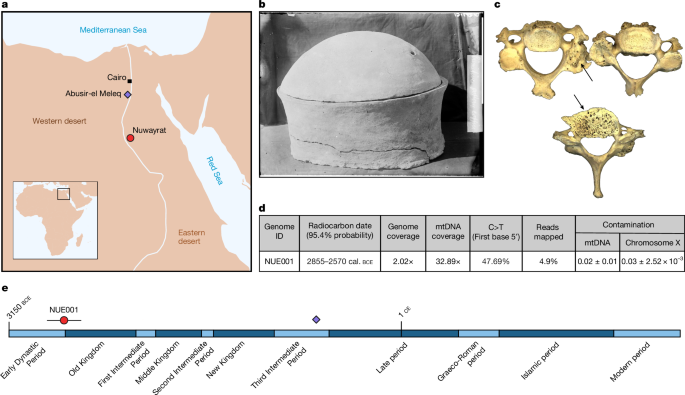#genomics
#genomics
[ follow ]
#archaeology #artificial-intelligence #ai #gene-regulation #dna-sequencing #ancient-egypt #dna #alphagenome
fromwww.bbc.com
6 days agoAI model from Google's DeepMind reads recipe for life in DNA
Called AlphaGenome, the model could help scientists discover why subtle differences in our DNA put us at risk of conditions such as high blood pressure, dementia and obesity. It could also dramatically accelerate our understanding of genetic diseases and cancer. The developers of the model acknowledge it's not perfect, but experts have described it as "an incredible feat" and "a major milestone".
Science
fromwww.cbc.ca
6 days agoNew project aims to map genomes of Black Canadians, provide better health outcomes | CBC News
In her 10 years as a health-care administrator, Cheryl Prescod has seen firsthand the ways Black Canadians can feel left behind by the blanket approach sometimes taken by the country's health-care system. As executive director at the Black Creek Community Health Centre in Toronto's Jane and Finch neighbourhood. Prescod serves a diverse clientele, including a large proportion of Black and racialized individuals people who say it can be difficult to access health care that makes them feel safe and culturally respected.
Public health
fromNature
1 month agoThe Nature Podcast highlights of 2025
Researchers have created a 'pangenome' containing the genomes of multiple potato types, something they believe can help make it easier to breed and sequence new varieties. The potato's complicated genetics has made it difficult to sequence the plant's genome, but improvements in technology have allowed the team to combine sequences, allowing them to look for subtle differences in between varieties.
Science
Public health
fromwww.theguardian.com
1 month agoMeet Dr Happi. With $100m and a steely determination could he save the world from the next pandemic?
Scientists Christian Happi and Pardis Sabeti built Sentinel, a genomics-based early warning network that identifies outbreaks and empowers African scientists amid shrinking global health funding.
fromwww.theguardian.com
1 month agoChanges to polar bear DNA could help them adapt to global heating, study finds
Now scientists at the University of East Anglia have found that some genes related to heat stress, ageing and metabolism are behaving differently in polar bears living in south-east Greenland, suggesting they may be adjusting to warmer conditions. The researchers analysed blood samples taken from polar bears in two regions of Greenland and compared jumping genes: small, mobile pieces of the genome that can influence how other genes work. Scientists looked at the genes in relation to temperatures in the two regions and at the associated changes in gene expression.
Environment
fromwww.nature.com
2 months agoAuthor Correction: Evidence for improved DNA repair in the long-lived bowhead whale
Full text for the reported correction and underlying study was not provided. Exact, verbatim quotes cannot be extracted without the article body or correction text. Please supply the article PDF, DOI, or the corrected text so that two to four precise extractable quotes (each ~60–85 words) can be returned verbatim from the source.
fromwww.nature.com
3 months agoThe new frontier in understanding human and mammalian brain development
Gidziela, A. et al. A meta-analysis of genetic effects associated with neurodevelopmental disorders and co-occurring conditions. Nat. Hum. Behav. 7, 642656 (2023). PubMed PubMed Central Google Scholar Buescher, A. V. S., Cidav, Z., Knapp, M. & Mandell, D. S. Costs of autism spectrum disorders in the United Kingdom and the United States. JAMA Pediatr. 168, 721728 (2014). PubMed Google Scholar
Science
fromNature
4 months agoHELIOS: a microcosm of Asian health with global reach
Longitudinal studies - which follow individuals to collect data about health, lifestyle and environment over a period of months, years or even decades - have helped researchers understand disease risk, inform prevention strategies and improve public health planning. But the majority of large-scale longitudinal research has historically taken place in Europe or North America, meaning many populations remain under-represented in the data. A new generation of longitudinal studies is aiming to better reflect population diversity - not just by recruiting from underserved groups, but by embedding community involvement, local scientific leadership and context-specific questions into their design.
Public health
Women in technology
fromwww.berkeleyside.org
8 months agoNew Berkeley Lab supercomputer named after Nobel laureate will power AI and scientific research
A new supercomputer named Doudna will enhance AI and genomic research at Berkeley Lab, honoring Nobel laureate Jennifer Doudna.
The Doudna supercomputer, built by Dell, aims to facilitate significant scientific discoveries and advancements in genomics.
[ Load more ]







